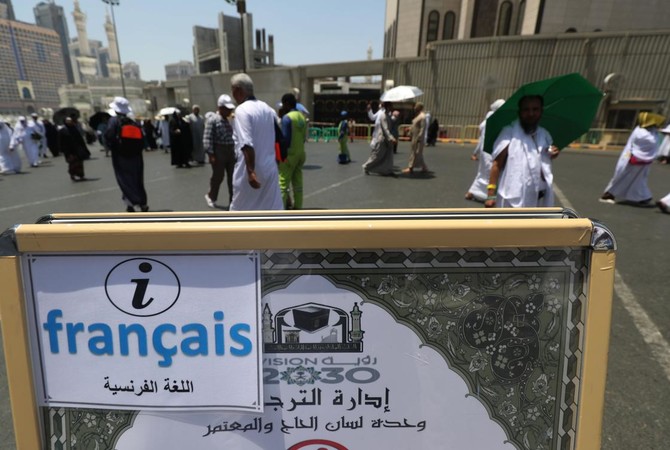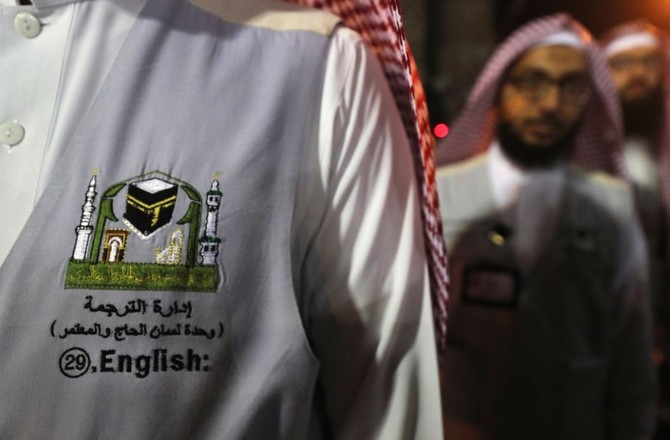MAKKAH, Saudi Arabia: Lost in translation? Not in Makkah, thanks to a dedicated squad of interpreters gearing up to help two million Muslims speaking dozens of languages at the annual Hajj pilgrimage.
The six-day Hajj, which starts on Sunday, is one of the five pillars of Islam, an act all Muslims must perform at least once if they have the means to travel to Saudi Arabia.
Most of the world’s Muslims do not speak Arabic — Indonesia is home to the largest Muslim community by population, while tens of millions of the faithful are native speakers of Urdu.
In all, 80 percent of pilgrims to the western Saudi city of Makkah are non-Arabic speakers, according to Mazen Al-Saadi of the official Hajj translation bureau.
His team provides 24/7 interpretation services in English, French, Farsi, Malay, Hausa, Turkish, Chinese and Urdu — the most widely spoken language among Hajj pilgrims.
For Samir Varatchia, who made the trip to Makkah from France’s Indian Ocean island of Reunion, the men in grey vests — the uniform of the official Hajj translation team — are a welcome sight.
“I really don’t know much Arabic,” Varatchia told AFP.
“The French translation will help us understand things, including the sermons.”
Tunisian interpreter Abdulmumen Al-Saket is happy to help, fielding frequent requests for his phone number.
“We try to help as much as we can, even with reading the maps,” he said.
“Some ask for our personal phone numbers, to call us later if they need help,” he added.
Pilgrims come to Makkah from across the world, including India, Pakistan, Nepal and Bangladesh. Many speak only Urdu, Saadi said.
Many of the signs directing pilgrims are translated into English, Urdu and in some cases, French.
Makkah’s Grand Mosque provides a range of translation and interpreting services to pilgrims.
Specialist departments deal with sermons and rulings, and a hotline is available in dozens of languages to answer religious questions.
But for practical matters, Saadi’s 80-strong team is indispensible.
The department has been in place for four years, he said, and is being continuously expanded to deal with rising demand.
“Most (pilgrims) don’t speak Arabic and are afraid to ask in the event of an accident,” Sanaullah Ghuri, an Indian translator, told AFP in Arabic.
A deadly stampede in 2015 left more than 2,000 pilgrims dead in Mina, the Makkah neighborhood where the symbolic stoning of the devil ritual takes place during Hajj.
Many pilgrims were unable to understand security forces’ instructions, delivered in Arabic.
The Hajj presents Saudi authorities with vast logistical challenges.
Islam is currently the world’s fastest-growing religion, according to the Pew Research Center, which says the number of Muslims in the world is expected to rise from 1.8 billion in 2015 to three billion in 2060.
The Hajj sees millions of pilgrims visit the country, all clad in white, to perform rituals in Makkah’s Grand Mosque and on the Mount Arafat plain east of Makkah.
It ends with Eid Al-Adha, a three-day feast which starts with the “stoning of the devil.”
Saudi Arabia, one of the world’s most restrictive countries, has recently embarked on an ambitious reform program spearheaded by the powerful young Crown Prince Mohammed bin Salman.
That has included pumping millions of dollars into high-tech initiatives.
Providing services for two million pilgrims is no small feat, and authorities are pushing a “smart Hajj” initiative this year to meet the rising demand.
That includes apps providing information on emergency medical services and geographic guides to Makkah and Mina, the two cities home to Islam’s holiest sites.
One app will also translate Hajj sermons into five languages.
But the Indian translator, Ghuri, said the presence of real-life interpreters made the experience of Hajj easier for pilgrims.
“When they see someone speaking their language, they feel more comfortable seeking help,” he said.


Lost in translation? Not for Muslim Hajj pilgrims
Lost in translation? Not for Muslim Hajj pilgrims

- In all, 80 percent of pilgrims to the western Saudi city of Makkah are non-Arabic speakers
- Many of the signs directing pilgrims are translated into English, Urdu and in some cases, French
Saudi Arabia, China foreign ministers discuss regional security in phone call

RIYADH: Saudi Minister of Foreign Affairs, Prince Faisal bin Farhan, received a phone call on Wednesday from Foreign Minister of China, Wang Yi.
During the call, they discussed current developments in the region, their repercussions on regional and international security and stability, and the efforts being made to address them.
© 2026 SAUDI RESEARCH & PUBLISHING COMPANY, All Rights Reserved And subject to Terms of Use Agreement.
















